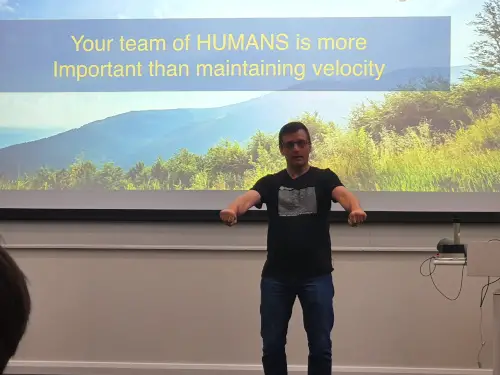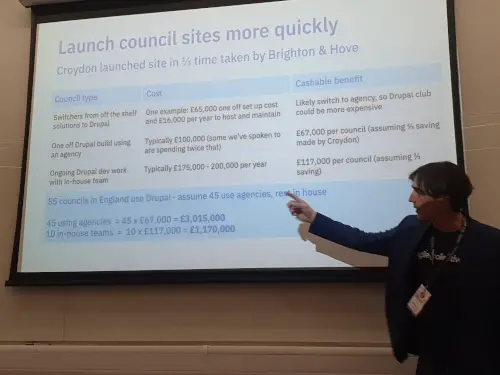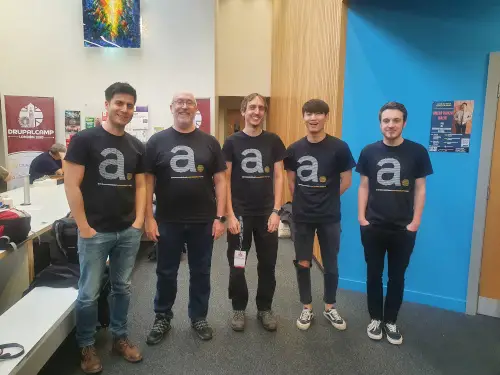DrupalCamp London was held on the 14th and 15th March 2020 and I went down to City University London to partake in the event. I wasn't talking this year, so I was there purely to enjoy the conference.
Saturday
The event started on Saturday morning with a quick talk from Rachael Lawson, who was talking about the Drupal Association. This was interesting as I hadn't realised all of the different ways that the Drupal Association were involved in Drupal. She started with an exercise where people stood up if they used an aspect of what the Drupal Association did. This included attending Drupal conferences, the drupal.org website, and the jobs.drupal.org website and even supporting initiatives like the recent marketing initiative. The bottom line is that if you use Drupal at all then you should absolutely get an individual membership.

Right after this we had Kevin Bridges talking about DevOps and Emotional Intelligence: Taking that next step. This was a look at the emotional side of DevOps and how the culture of an organisation is important to success. Some of the lessons Kevin talked about were very reminiscent of lessons from Radical Candour. Having a culture of kindness, appreciating that DevOps is hard, and to allow people to fail is important in allowing the team to collaborate and grow. A really interesting talk with lots of little take home points.
After a little break I went to Architecting a Highly Scalable, Voice enabled and Platform agnostic Federated Search with Vidhatanand. This was a case study around a rather complex setup that involved lots of separate pieces that had a global search feature.
Next up was Finn Lewis, who was talking about LocalGov Drupal. This is an open source collaboration between UK councils that looks to solve common problems. More than 6 councils around the UK use Drupal to host their sites and so a collaboration between these different agencies means that a great deal of time and effort is reduced. This collaboration has been achieved both with a simple legal framework and by the sharing of code. The group is trying to put together an install profile, and there was some discussion in the room about how that could be achieved in a clean way. If you want to find out more then you can look at the slides of the talk, which contains lots of great statistics and analysis.

After lunch was Continuous Integration and Continuous Deployment designs with Hussain Abbas. This was a look at a few tools that Hussain uses to build and deploy Drupal sites. Including Docker, Jenkins, and some PHP code analysis libraries. Lots of good take home lessons and a few things to try out for those getting started. Hussain also had a really interesting speech to text system that shows subtitles on the screen, although this often produced some strange sentences it was a really interesting way of being as accessible as possible.
The next talk was with Evgenii Nikltin, who was talking about MemSQL and Drupal. MemSQL is a database system that stores the data entirely in memory, as such it has a large memory footprint, but is useful in certain situations. It is an MySQL API compatible database system and so you can use the standard PDO and mysqli libraries from PHP to interface with it. Evgenii has created a Drupal module that allows Drupal to use MemSQL and took us through some Drupal examples where MemSQL really helps. Apparently, it's best used when looking at lots of read and write operations on medium sized datasets. So things like real time analytics or dashboards are useful to implement in MemSQL.
The final talk of the day was with Alex Moreno and Terry Anderson, who were talking about enterprise projects and how to manage them. Alex and Terry both work at Acquia and I have worked with them on enterprise clients in the past. It was good to get more of an oversight into what enterprise means and how these organisations tend to work. I'm also quite pleased they included a reference to Star Trek in their talk.
After this we all went off to the Coin Laundry for some free drinks, provided by the camp.
Sunday
The second day of the conference began with a keynote from Nick Veenhof, who talked about moving beyond a simple CMS and into digital experience, or DXP. This is essentially providing more than just Drupal to website owners. It's about providing analytics, personalisation, CRM systems, marketing and automation services. Nick showed us some of the tools that have been built at Dropsolid. This included Drupal to power the user interface and personalisation, with Mautic and Apache Unomi to power the CRM and marketing automation side of things. Together Nick demonstrated a suite of tools that is quite far ahead of anything I have seen demonstrated yet. Really impressive stuff and well worth a look if you are thinking of using personalisation.
Speaking of personalisation, the next talk was all about how to personalise a Drupal site in much the same way as Netflix does. Akanksha Singh went through a few different techniques and modules that showed how to personalise things. Really interesting outcomes as well, and all ready simple to achieve in Drupal using a few modules and some cookies. Akanksha did a lot of demos in the talk (which I always find brave) and the demo only misbehaved a couple of times.
The final session of the weekend was with Brent Gees and Wouter De Bruycker talking about Drupal SEO pitfalls and how to avoid them. I've had some recent troubles with some of the latest advances in SEO and how Drupal works, so this talk was really helpful for me. Lots of little tips and tricks as well as why you should be doing them.
After a final session with closing remarks and lots of thank you messages it was time to go home.
Overall
What I haven't mentioned yet there was a cloud over the whole conference this year. The impact that COVID-19 virus had on the conference was pretty noticeable. Whilst the conference normally expects around 400 attendees, this year the attendance was around 70. This meant that many of the sessions were cancelled or delivered remote. I saw the organisers of the camp rapidly trying to reorganise things to fill the slots on the day and they did an amazing job really. The remote sessions were just as well delivered as those in person, and it showed how well the technology could work. A few people who didn't attend were also able to attend remotely, which was really nice to see.

I was watching the news carefully in the run up to the event and was satisfied that the camp was taking very clear guidance from the venue and the government. They encouraged people to wash their hands and had hand sanitisers out. I don't blame people for staying away, had the camp been a week later then I probably would not have attended either. The situation clearly caused a great deal of stress to the organisers, which was not helped by some of the vitriol they received online. The sense of community around the camp and the quality of the sessions that were delivered was excellent though and it was great to see the community come together in a crisis.




Add new comment